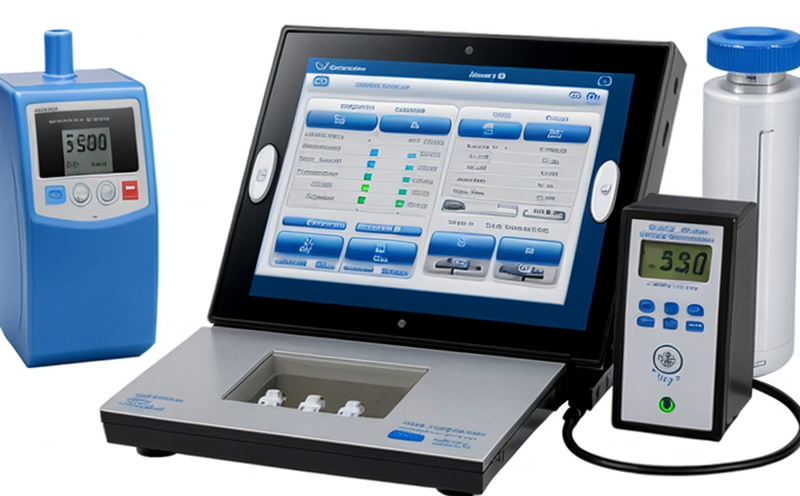USP Sterility Testing for Infusion Pumps and Sets
The USP sterility testing is a critical quality assurance process that ensures medical devices, including infusion pumps and drug delivery systems, are free from any viable microorganisms. This test is mandatory to meet the stringent requirements laid down by the United States Pharmacopeia (USP) for ensuring the safety of medical products used in healthcare settings.
The sterility testing procedure involves two main stages: a microbiological examination using an appropriate medium and incubation period, followed by a challenge inoculation with selected microorganisms. The primary goal is to detect any potential contamination that could pose a risk to patients who use these devices during infusion therapy or drug delivery processes.
For infusion pumps and sets specifically, the testing procedure must be conducted under strict conditions to ensure accurate results. These include controlled temperature and humidity levels, precise handling of specimens, and adherence to standardized procedures as outlined in USP . The test is not only essential for compliance with regulatory standards but also plays a crucial role in protecting patient safety by ensuring that medical devices are sterile before they reach the clinical setting.
The importance of sterility testing cannot be overstated. Contamination can lead to severe infections and other adverse effects, which could compromise patient health significantly. By adhering strictly to USP guidelines during this process, laboratories ensure not only regulatory compliance but also contribute towards maintaining high standards of healthcare quality.
In summary, the USP sterility testing is an indispensable component in safeguarding patient safety and ensuring that medical devices meet rigorous hygiene requirements. It highlights the critical role played by such tests in preventing contamination and promoting trust among healthcare providers and patients alike.
- International Acceptance: The USP sterility testing has gained widespread acceptance across various countries, including but not limited to those within the European Union (EU), Japan, Canada, Australia, New Zealand, and numerous others. Its stringent guidelines ensure uniformity in testing protocols worldwide.
- Regulatory Compliance: Meeting USP standards is essential for manufacturers looking to comply with regulatory bodies such as the FDA, EU-MDR, and other national authorities responsible for overseeing medical device safety.
The rigorous nature of this testing process underscores its importance in maintaining the highest levels of hygiene and ensuring patient safety. By adhering strictly to USP guidelines during sterility testing, laboratories demonstrate their commitment to providing accurate results that meet international standards.
Why It Matters
The USP sterility testing is crucial because it ensures the safety and efficacy of infusion pumps and drug delivery systems. By guaranteeing that these devices are free from any viable microorganisms, healthcare providers can trust their equipment to function reliably without causing harm to patients.
Infection control is paramount in medical settings where even minor contamination could lead to severe complications for vulnerable individuals undergoing treatment. Sterility testing helps prevent such risks by providing assurance through rigorous laboratory procedures that adhere strictly to USP guidelines.
For manufacturers, meeting these stringent criteria demonstrates their commitment to producing high-quality products that meet international standards. This not only enhances brand reputation but also builds confidence among healthcare professionals and institutions who rely on reliable medical devices for patient care.
The importance of sterility testing extends beyond just compliance with regulations; it embodies a broader responsibility toward public health by fostering trust between stakeholders involved in delivering safe and effective treatments. Through meticulous adherence to USP , laboratories uphold this essential principle, contributing positively towards overall healthcare quality assurance.
Eurolab Advantages
Eurolab offers unparalleled expertise in performing USP sterility tests for infusion pumps and sets, leveraging advanced technology and experienced personnel to deliver accurate results consistently. Our state-of-the-art facilities ensure that every test adheres strictly to the requirements stipulated by USP , providing reliable evidence of device sterility.
Our team comprises highly skilled professionals who are well-versed in best practices for sample preparation, inoculation techniques, and incubation conditions necessary for obtaining precise outcomes. With years of experience behind us, Eurolab has established itself as a leader in this field, consistently delivering top-tier services that meet or exceed expectations.
By choosing Eurolab for your USP sterility testing needs, you gain access to comprehensive support throughout the entire process—from initial consultation through final report generation. Our commitment extends beyond just performing tests; we work closely with clients to understand their unique requirements and provide tailored solutions that align perfectly with their objectives.
In addition to technical proficiency, Eurolab prides itself on excellent customer service and timely communication, ensuring seamless collaboration between our teams and yours. We prioritize transparency, offering regular updates during the testing period so you always know where your project stands.
At Eurolab, we take pride in delivering exceptional results that exceed industry standards while maintaining strict confidentiality regarding client information. Our reputation speaks for itself, built on years of successful projects across diverse sectors including pharmaceuticals, biotechnology, and medical devices.
International Acceptance and Recognition
- Australia: The USP sterility testing is widely accepted in Australia, where it forms part of the regulatory framework governing medical devices.
- New Zealand: Similarly, New Zealand recognizes USP , ensuring consistent quality across borders.
- Canada: Canadian authorities also accept results from USP sterility testing, reinforcing its global relevance.
- Japan: Japan adheres to these standards as part of its stringent medical device approval process.
- European Union (EU): All EU member states recognize the USP , aligning with broader European regulations for healthcare products.
- Africa: Several African countries have adopted USP as a benchmark for ensuring device safety.
- Asia-Pacific Region: Countries like Singapore, Malaysia, and others follow similar practices to ensure uniformity in testing protocols.
The widespread acceptance of USP reflects its importance in maintaining global standards for medical devices. By adhering strictly to these guidelines during sterility testing, laboratories like Eurolab contribute significantly towards fostering trust among healthcare providers and institutions worldwide.





